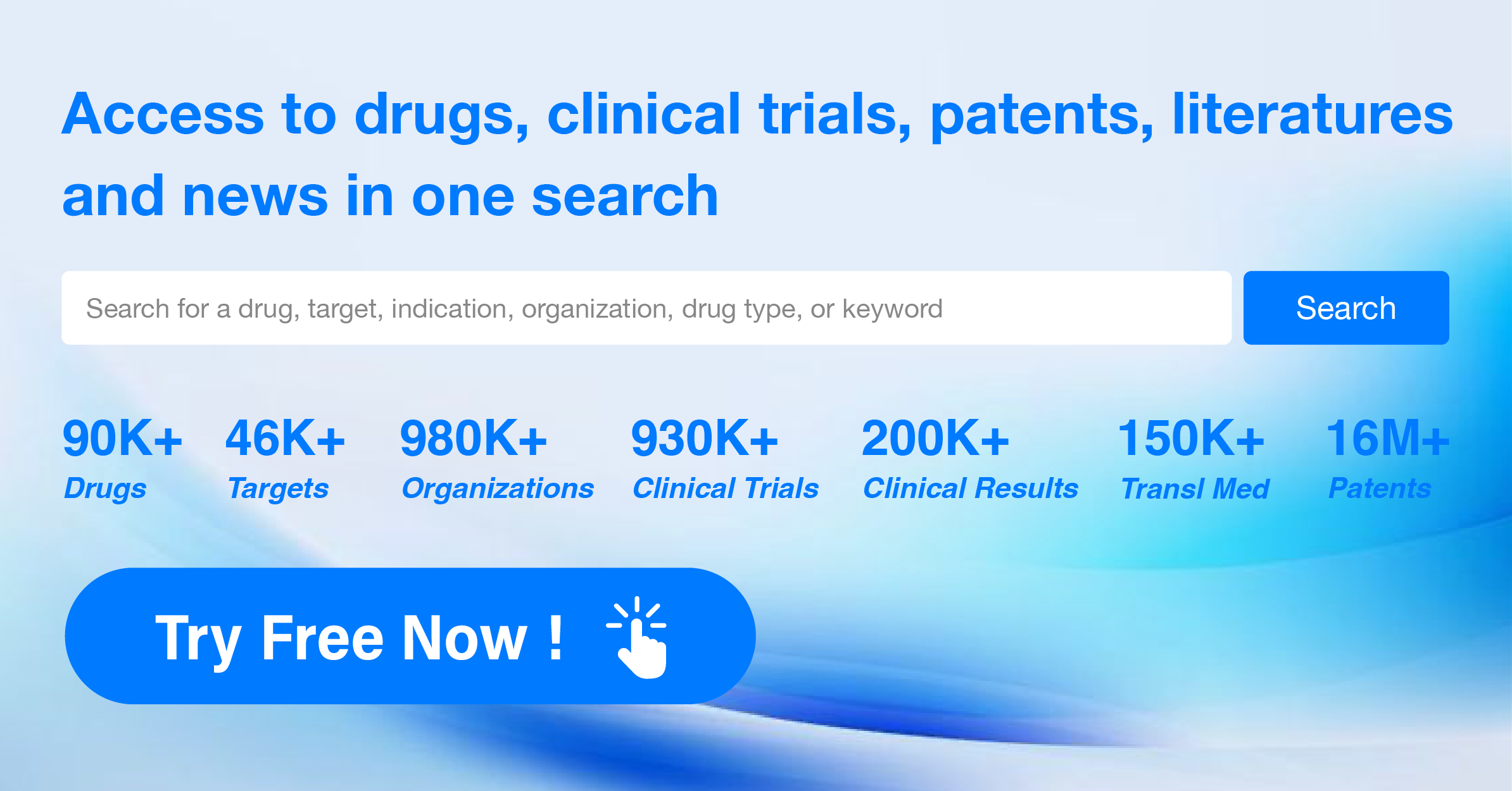Pharma Frontiers: Daily Digest of Global Pharmaceutical News – Aug 2
1.Bayer's NK-1/NK-3 Receptor Antagonist Elinzanetant Submitted for Marketing Authorization to Treat Menopausal Hot Flashes
On August 1st, Bayer announced the submission of a New Drug Application (NDA) to the U.S. FDA for the dual NK-1/NK-3 receptor antagonist, elinzanetant, intended for the treatment of moderate to severe vasomotor symptoms (VMS) associated with menopause, commonly known as hot flashes. The submission is based on the positive results from the Phase III OASIS 1, 2, and 3 studies, which evaluated the efficacy and safety of elinzanetant compared to placebo in treating VMS related to menopause. The results demonstrated that elinzanetant (120mg, oral, once daily) significantly reduced the frequency and severity of moderate to severe VMS and showed good safety profiles. Headaches and fatigue were the most common treatment-emergent adverse events in the elinzanetant group. Continued improvements were also observed in three key secondary endpoints in the OASIS 1 and OASIS 2 studies, including a significant reduction in the frequency of VMS from the first week, improvements in sleep disturbances, and quality of life related to menopause. Elinzanetant is the first dual NK-1 and NK-3 receptor antagonist and works by modulating a group of estrogen-sensitive neurons in the hypothalamus (KNDy neurons) of the brain. In menopausal women, reduced estrogen levels lead to hypertrophy of KNDy neurons, resulting in the overactivation of the body temperature regulation pathways and disrupting the thermoregulatory mechanisms, causing VMS. Hot flashes are one of the most common symptoms of menopause and can negatively impact women's quality of life, with an estimated 1.2 billion women projected to be affected worldwide by 2030. Besides the OASIS project, Bayer is also conducting the NIRVANA study (NCT06112756), which aims to evaluate the efficacy of elinzanetant in treating sleep disturbances associated with menopause.
2.Innovent Biologics Applies for New Indication for its Dual Agonist, Masmotide Injection (IBI362)
On August 1st, the official website of the Center for Drug Evaluation (CDE) displayed that Innovent Biologics has applied for a new indication of its glucagon-like peptide-1 receptor (GLP-1R) and glucagon receptor (GCGR) dual agonist, masmotide injection (IBI362). Based on ongoing clinical trials, the newly applied indication is for type 2 diabetes. Its first indication for weight loss was accepted earlier in 2024. On July 22nd, Innovent announced that their Phase III clinical trial in China for type 2 diabetes patients using masmotide, named DREAMS-1, had achieved its primary endpoint and all key secondary endpoints. Previously, the Phase III DREAMS-2 study comparing masmotide with dulaglutide for the treatment of type 2 diabetes also met its study endpoints.
DREAMS-1 (NCT05628311) is a randomized, double-blind, placebo-controlled Phase III clinical trial assessing the efficacy and safety of masmotide in Chinese patients with type 2 diabetes, who showed poor glycemic control despite diet and exercise interventions. The study enrolled 320 participants (with an average baseline HbA1c of 8.24% and an average weight of 77.7 kg) who were randomly assigned in a 1:1:1 ratio to receive either 4 mg of masmotide (N=106), 6 mg of masmotide (N=106), or placebo (N=108), undergoing double-blind treatment for 24 weeks. After completing the double-blind treatment, participants in the 4 mg and 6 mg masmotide groups continued with their respective doses for another 24 weeks, while those in the placebo group received 6 mg of masmotide for the same duration. The primary endpoint was the superiority of both the 4 mg and 6 mg masmotide doses over placebo in the change in HbA1c from baseline at week 24. According to efficacy estimates, the average reductions in HbA1c from baseline at week 24 for the 4 mg and 6 mg masmotide groups were 1.57% and 2.15%, respectively, both significantly better than the placebo group (0.14%) (P-value <0.0001), achieving the primary endpoint. The reduction in HbA1c in the masmotide groups was maintained until week 48.
3.First-line treatment for renal cell carcinoma! Chia Tai Tianqing's PD-L1 combination therapy applies for new indication approval
On August 1, the Center for Drug Evaluation (CDE) of China's National Medical Products Administration publicized that the application for new indication of Anlotinib Dihydrochloride Capsules and Benmelstobart injection, developed by Chia Tai Tianqing, was accepted. In May of this year, Chia Tai Tianqing announced that the phase III clinical study of Benmelstobart in combination with Anlotinib for the first-line treatment of advanced unresectable or metastatic renal cell carcinoma (RCC) met its primary endpoint. It is expected that the application for this combination therapy for the new indication will be submitted soon. Thus, it is inferred that the current application for market approval is for the first-line treatment of renal cell carcinoma. Benmelstobart (TQB2450) is a novel sequence, innovative humanized monoclonal anti-PD-L1 antibody developed by Chia Tai Tianqing, which was first approved in May this year in China, indicated for use in combination with Anlotinib capsules, Etoposide, and Carboplatin for the first-line treatment of extensive-stage small cell lung cancer (ES-SCLC). Anlotinib is a novel small molecule multi-target tyrosine kinase inhibitor developed by Chia Tai Tianqing, first approved in China in 2018, and has since been approved in China for multiple cancer indications, including non-small cell lung cancer, small cell lung cancer, soft tissue sarcoma, medullary thyroid carcinoma, and differentiated thyroid carcinoma. In January 2024, the combination of Benmelstobart and Anlotinib capsules for the treatment of recurrent or metastatic endometrial cancer was included in the priority review by CDE, marking the second market application of this combination therapy. According to earlier press releases by Chia Tai Tianqing, first-line advanced renal cell carcinoma will be the third indication for Benmelstobart application and the eighth indication for Anlotinib application.
4.Eisai/Biogen Jointly Developed Alzheimer's Therapy Leqembi Reveals Three-Year Long-Term Data!
Recently, Eisai and Biogen announced the latest results from a three-year trial of their jointly developed Alzheimer's therapy, Leqembi (lecanemab), at the 2024 Alzheimer’s Association International Conference (AAIC). The data indicates that 51% of the earliest-stage Alzheimer’s disease (AD) patient subgroup, who were treated with lecanemab and had very low or undetectable tau protein levels at baseline, showed sustained cognitive and functional improvement over three years.
The data released came from the Clarity AD trial, a global, placebo-controlled, randomized double-blind, parallel-group phase 3 study, which enrolled 1795 patients with early-stage AD (drug group: 898 people receiving 10 mg/kg of lecanemab via intravenous injection every two weeks; placebo group: 897 people). Of the participants who completed the core study (18 months), 95% chose to continue in the open-label extension (OLE) study.
In the Clarity AD core study, the primary endpoint on the Clinical Dementia Rating-Sum of Boxes (CDR-SB, where a higher score indicates worse clinical function), the mean change in CDR-SB for the lecanemab group compared to baseline was 1.21 points, which is 0.45 points less than the placebo group (1.66 points) (P=0.00005). Over the three years of treatment in both the core study and OLE, lecanemab reduced the rate of cognitive decline based on CDR-SB by an average of 0.95 points compared to similar patient data from the Alzheimer’s Disease Neuroimaging Initiative (ADNI) group.Continuous three-year treatment with lecanemab did not reveal any new safety concerns. Most amyloid-related imaging abnormalities (ARIA) occurred within the first six months of treatment. After six months, the incidence of ARIA was lower and similar to that in the placebo group.
5.The FDA grants permission for Umoja's in vivo CAR-T therapy, UB-VV111, to enter human clinical trials
On August 1st, Umoja Biopharma announced that the U.S. FDA approved their Investigational New Drug (IND) application for UB-VV111, an in-situ generated CAR-T cell therapy targeting CD19, intended for the treatment of hematologic malignancies. Umoja anticipates initiating Phase 1 trials by the end of 2024, with the first patient dosing to follow. According to the press release, UB-VV111 may represent the first in-situ generated CD19-targeting CAR-T cell therapy in human hematologic trials. Umoja's VivoVec delivery platform combines third-generation lentiviral vector gene delivery technology with a novel T-cell targeting and activation surface complex. This allows for the production of anti-cancer CAR-T cells within the patient's body, potentially overcoming several challenges associated with traditional CAR-T therapies. These challenges include reliance on collecting a patient’s own or donor cells, associated delays in cell manufacturing, ex vivo cell modification before reinfusion into the patient, and the need for lymphodepletion before treatment. In September of last year, Umoja announced that the VivoVec platform had effectively and durably generated CAR-T cells in a non-human primate (NHP) study, demonstrating good tolerability and achieving proof of concept. UB-VV111 is an in vivo CAR-T cell therapy developed via the VivoVec platform. It includes an engineered viral envelope and carries transgenes encoding for a CD19-targeting CAR and the Rapamycin-Activated Cytokine Receptor (RACR™), designed to amplify UB-VV111 engineered CAR-T cells within the patient. This therapy marks the first clinical pipeline entry for the VivoVec gene delivery platform. The Phase 1 study of UB-VV111 is a dose-escalation and verification study designed to evaluate the safety, tolerability, and clinical anti-tumor activity of UB-VV111. The study will recruit patients with relapsed/refractory large B-cell lymphoma (LBCL) and chronic lymphocytic leukemia (CLL), including both CAR-T naive and pretreated patients.
6.Pumis Biotechnology's Bispecific Antibody Innovation Drug Approved for Clinical Trials
On July 31, the Center for Drug Evaluation (CDE) of the National Medical Products Administration of China officially announced that Pumis Biotechnology's PM1032 injectable has been granted implicit permission for clinical trials, intended for use in combination with chemotherapy for the treatment of locally advanced/metastatic pancreatic cancer. Publicly available information indicates that PM1032 is an anti-CLDN18.2/4-1BB bispecific antibody. According to publicly disclosed information from Pumis Biotechnology, PM1032 acts as a conditionally activated 4-1BB agonist, which can induce the activation of a CLDN18.2-dependent specific 4-1BB signaling pathway in tumors with high CLDN18.2 expression, thereby enhancing the activity of T cells within the tumor microenvironment and inducing the formation of tumor antigen-specific memory T cells. Since the drug stimulates immune activation only when CLDN18.2 is expressed on target cells, it can maintain effective antitumor effects while reducing systemic toxicity. At this year's American Society of Clinical Oncology (ASCO) meeting, researchers presented first-in-human phase 1/2 results on the safety and preliminary efficacy of PM1032 in patients with advanced solid tumors. As of January 12, 2024, a total of 30 patients had been treated with PM1032 (18 during the dose-escalation phase and 12 during the dose-expansion phase), with no dose-limiting toxicities (DLTs) observed. CLDN18.2 expression was detectable in 80% of patients, 66.7% of whom were positive. The most common tumor types were gastrointestinal tumors, including 14 cases of gastric and gastroesophageal junction cancer (GC/GEJ), 10 cases of pancreatic ductal adenocarcinoma (PDAC), and 5 other gastrointestinal tumors. This new approval of PM1032 injectable for clinical trials focuses on pancreatic cancer as an indication. Pancreatic cancer, often referred to as the "king of cancers" due to its high lethality and difficulty to treat, remains a disease with very limited treatment options despite the increasing number and variety of innovative therapies. The expression rate of CLDN18.2 in patients with pancreatic cancer ranges from 50% to 70%, making it a highly regarded target for therapeutic intervention.
7.Over $400 million to develop potential "first-in-class" bispecific ADC cancer therapies!
On August 1, IDEAYA Biosciences announced a collaboration agreement with Biocytogen Pharmaceuticals potentially exceeding $400 million. IDEAYA will have the option to obtain global exclusive licensing for Biocytogen's potential "first-in-class" bispecific antibody-drug conjugate (BsADC) therapy. Biocytogen is a global biotechnological company based on gene-editing technology, and utilizes its proprietary genetically engineered RenMice (RenMab/RenLite/RenNano/RenTCR-mimic) platform for the discovery of fully human monoclonal/bispecific/multispecific antibodies, bispecific antibody-drug conjugate discovery, nanobody discovery, and T-cell receptor (TCR) mimic antibody discovery. This agreement focuses on a BsADC project targeting B7H3/PTK7 with topoisomerase-I inhibitors as the effective payload. B7H3/PTK7 is expressed in various solid tumor types, including lung cancer, colorectal cancer, and head and neck cancer. Preclinical data suggest that the potential "first-in-class" B7H3/PTK7-targeted BsADC therapy could be developed as a monotherapy, and used in combination with multiple DNA damage repair (DDR) therapies from IDEAYA, including the PARG inhibitor IDE161. IDEAYA anticipates nominating a candidate therapy for the B7H3/PTK7-targeted BsADC project in the second half of 2024. According to the terms of the agreement, Biocytogen will receive an upfront payment and, upon IDEAYA exercising its option, will be entitled to option exercise fees, as well as payments associated with development, regulatory, and commercial milestones, totaling potentially $406.5 million.
How to obtain the latest research advancements in the field of biopharmaceuticals?
In the Synapse database, you can keep abreast of the latest research and development advances in drugs, targets, indications, organizations, etc., anywhere and anytime, on a daily or weekly basis. Click on the image below to embark on a brand new journey of drug discovery!




